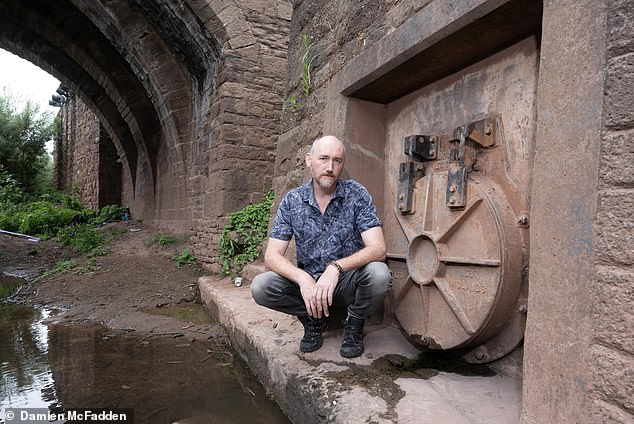For the past ten years Kim Hilton has been a regular and enthusiastic ‘wild’ swimmer, often taking dips along the banks of the River Wye near where he lives.
‘There’s something wonderful about wild swimming – it’s something I did as often as I could,’ says the 48-year-old artist and river water safety campaigner.
But then one sunny day a few weeks ago in June, Kim and a group of friends went for a swim in the River Frome and within hours he began feeling ill, leading to pain so bad that he ended up in hospital.
‘I am now so much more cautious about going in the water, the pollution has got so bad that even my dog gets sick in some rivers,’ he says.
Kim and his friends had been swimming in a spot on the river that’s a designated bathing area – ‘so I knew the water was tested plus all the other swimmers regularly meet there so I assumed the water was safe’, he says.
Many wild swim areas are marked on maps or apps produced by voluntary organisations (as well as Swimfo, from the Environment Agency) to aid swimmers by providing information about safety and cleanliness of any given spot.
So Kim dived in with confidence.
He says: ‘I have been ill with stomach bugs a few times from wild swimming and am always careful not to put my face underwater but on this day I just really wanted to submerge myself and felt safe enough to risk it so put my head under just once – and then popped up again.’

Kim Hilton with his son Lochryn. Kim says he is much more cautious about swimming in rivers after getting sick from wild swimming

Kim says the decline of the quality of rivers in the UK is ‘really sad’. Last year UK water companies released raw sewage into England’s rivers and seas for a record 3.61 million hours

Olympic rower Andy Holmes, left, died in 2010 after contracting leptospirosis – which can be contracted from coming into contact with infected water
After a quick 30-minute swim he went home but within the hour he developed a stomach ache.
‘I’d had stomach bugs after swimming before so thought it would pass or be a two-day thing,’ he says.
But as the hours passed it got worse, with severe cramps in his bowel. ‘Although I wasn’t sick and didn’t have diarrhoea, the pain was worse than other bugs,’ he says. ‘It was very bad.’
Within two days the pain, which had now moved to below his right rib cage, was getting worse.
By day five it was affecting his sleep and work. ‘I was limping about, gasping with sharp pain,’ he says. It hurt to breathe and it felt as if he was being stabbed, with someone twisting the knife whenever he moved.
Kim got an emergency appointment with his GP who suspected gall bladder problems and immediately sent him to hospital, where he was admitted to an acute surgical unit. There he was given blood and urine tests. ‘I kept thinking how is this all happening just from one swim?’ he says.
Wild swimming has increased in popularity in recent years with swimmers using apps such as The Safer Seas And Rivers Service, developed by the campaign group Surfers Against Sewage, to find the safest places to swim in real time. The need for this comes as it’s been revealed that last year UK water companies released raw sewage into England’s rivers and seas for a record 3.61 million hours, according to the Environment Agency.
Kim’s shocking experience is sadly far from unique.

Christian Macutkiewicz of Manchester Royal Infirmary says that while most waterborne diseases are not serious, they can lead to deadly conditions such as sepsis
Data released in May this year show that some of the UK’s most popular wild swimming spots have seen a huge increase in potentially life-threatening bacteria between 2023 and 2024. The Serpentine Lido in London’s Hyde Park recorded a 1,188 per cent increase in levels of E.coli in water samples, while at Hampstead Heath Mixed Pond there was an increase of 230 per cent, according to an independent analysis of figures from the Environment Agency.
‘The most common bacteria picked up by wild swimmers is E.coli which can, in worst case scenarios, lead to sepsis,’ says Christian Macutkiewicz, a consultant general and hepato-pancreatico-biliary surgeon (a specialist in liver, pancreas, gallbladder and bile ducts surgery) at Manchester Royal Infirmary.
As he explains: ‘There are lots of strains of E.coli, and most of them do not cause us harm as they are a normal type of bacteria in our gut – but some are more virulent and these infections can overwhelm the immune system and lead to sepsis especially in the elderly or very young.’
How long does it take for symptoms to appear?
Incubation periods of such bugs can vary according to dose, strain, individual genetics and immune response, says Dr Hoare, ‘norovirus often occurs within 12 hours, the rest generally two to five days but can be one to ten days
<!- – ad: https://mads.dailymail.co.uk/v8/us/health/none/article/other/mpu_factbox.html?id=mpu_factbox_1 – ->
Advertisement
Wild swimmers can also inadvertently ingest cryptosporidium, a microscopic parasite that causes cryptosporidiosis – an intestinal infection characterised by watery diarrhoea. ‘This can cause dehydration and it is important that the person drinks plenty of water and electrolytes,’ says Mr Macutkiewicz.
Another risk is contracting leptospirosis, a bacterial infection common in rats, dogs and cattle. ‘It can be caught by ingesting it but also through open cuts, eyes, nose etc,’ says Dr Jonathan Hoare, a consultant in gastroenterology and general internal medicine at Imperial College Healthcare NHS Trust. ‘This does not cause typical diarrhoea and vomiting but a flu-like illness. Very severe infection [known as Weil’s Disease] can lead to liver failure and lung disease.’
Two-time Olympic gold medalist rower Andy Holmes died in 2010 after contracting leptospirosis.
Dr Hoare adds that it can be difficult to diagnose because leptospirosis incubation can be up to 30 days so it may not be obvious that the symptoms are linked to water.
‘Most infections caught swimming are from sewage contamination so are the same as the common food poisoning bugs i.e. they’re caused by ingesting contaminated faeces,’ says Dr Hoare.
Another source is ‘run-off’ from poorly managed farms which is contaminated with animal faeces, he adds.
Viral infections, such as norovirus, can also be passed through sewage into waterways, says Dr Hoare.
Mr Macutkiewicz adds: ‘Skin and ear infections are also common.’
Fortunately, most gut infections are ‘mild and require no treatment’, says Dr Hoare who advises ensuring you are well hydrated, eating plain food and taking an oral rehydration treatment such as Dioralyte.
‘Seek medical attention if symptoms persist severely for more than two to three days, or if you’re worried about getting dehydrated for instance,’ he says.
While for most people a gut infection should soon settle Mr Macutkiewicz warns this may not be the case for elderly and young people, who have weaker immune systems and may need medical treatment, particularly if they have a virulent strain of a bug.
Initially it was thought Kim might have gallstones, but an ultrasound showed no sign nor any signs of kidney stones or kidney inflammation.
With no other obvious reason for his symptoms, the doctor agreed it might be related to wild swimming, with a waterborne infection such as E.coli entering his bowel and causing inflammation near his gallbladder that mimicked gallstone pain.
‘The doctor said I was lucky I came in when I did. I read up on it afterwards and learned that such infections could even cause a burst gall bladder, leading to sepsis,’ says Kim.
He was sent home with two different strong antibiotics, and fortunately was back to normal within days.
But he says: ‘It has seriously impacted my enjoyment of this wonderful experience that should be available to everyone in safety, especially during this very hot summer.’
Giles Bristow, CEO at Surfers Against Sewage, told Good Health: ‘Year after year, the number of sewage dumps in our seas, rivers and lakes remains disgustingly high, and we continue to receive sickness reports via the Safer Seas And Rivers Service app, every single day. Last year almost 2,000 people reported becoming unwell after using their local swim spot – this is totally unacceptable.’
He adds that the situation is the result of ‘devastating underinvestment’ by water companies who constantly discharge sewage ‘while siphoning off tens of billions to shareholders’.
Kim recently swam in the sea but has been seriously put off swimming in rivers – ‘which is terrible as it’s something I love’.
He adds: ‘I’ve lived on the River Wye for 20 years and watching its decline is like watching a family member being killed slowly. Even five years ago rivers weren’t as bad as this. They have gone from undrinkable, to unswimmable to untouchable. And that is really very sad.’
